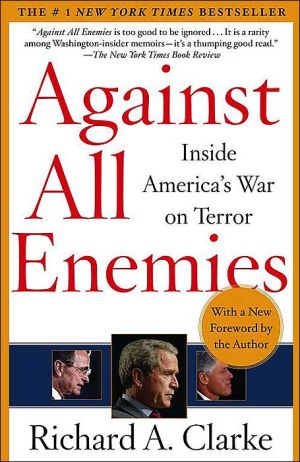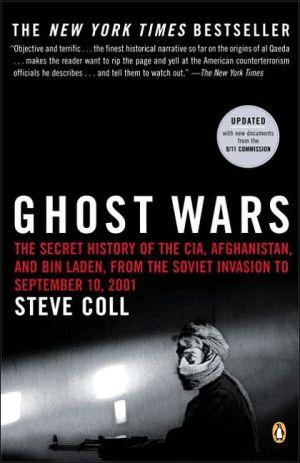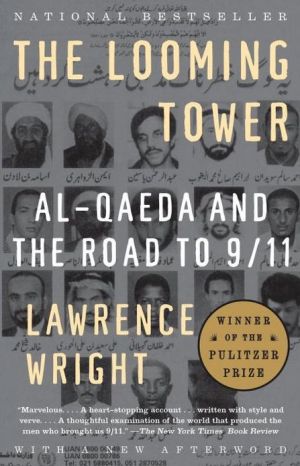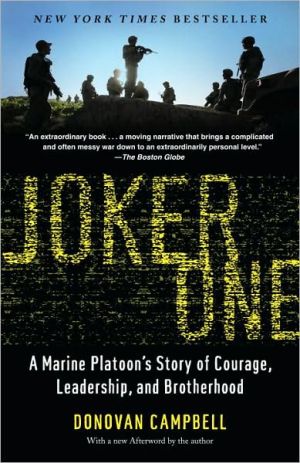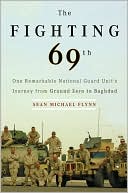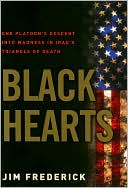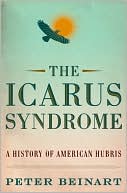Against All Enemies: Inside America's War on Terror
THE EXPLOSIVE INTERNATIONAL BESTSELLER\ With all-new excerpts from Richard Clarke's dramatic public testimony, and revealing corroboration from The 9/11 Commission Report\ From the 9/11 Commission Report:\ "On the day of the meeting [September 4, 2001], Clarke sent Rice an impassioned personal note. He criticized U.S. counterterrorism efforts past and present. The 'real question' before the principals, he wrote, was 'are we serious about dealing with the al Qida threat?...Is al Qida a big...
Search in google:
The one person who knows more about Usama bin Laden and al Qaeda than anyone else in this country, Richard Clarke has devoted two decades of his professional life to combating terrorism. Richard Clarke served seven presidents and worked inside the White House for George H. W. Bush, Bill Clinton, and George W. Bush until he resigned in March 2003. He knows, better than anyone, the hidden successes and failures of the Clinton years. He knows, better than anyone, why we failed to prevent 9/11. He knows, better than anyone, how President Bush reacted to the attack and what happened behind the scenes in the days that followed. He knows whether or not Iraq presented a terrorist threat to the United States and whether there were hidden costs to the invasion of that country." Clarke was the nation's crisis manager on 9/11, running the Situation Room - a scene described here for the first time - and then watched in dismay at what followed. After ignoring existing plans to attack al Qaeda when he first took office, George Bush made disastrous decisions when he finally did pay attention. Coming from a man known as one of the hard-liners against terrorists, Against All Enemies is both a powerful history of our two-decades-long confrontation with terrorism and a searing indictment of the current administration. Foreign Affairs Clarke's book turned out to be one of the first shots in the gradual undermining of President Bush's reputation as a war leader-especially since many of Clarke's more damaging accusations have been corroborated elsewhere, including in the investigations undertaken by the 9/11 Commission. The opening sequence, as Clarke describes his efforts as "counterterrorism czar" to respond to the incoming news of the September 11 attacks, is gripping, and his description of the development of policy during the George H.W. Bush and Clinton administrations is useful, if unavoidably self-centered. The big story, of course, lies in his depiction of the current Bush administration's failing to take seriously the al Qaeda threat and then going off on its Iraq tangent.
from Against All Enemies\ Wolfowitz fidgeted and scowled.... "Well, I just don't understand why we are beginning by talking about this one man bin Laden."\ "We are talking about a network of terrorist organizations called al Qaeda, that happens to be led by bin Laden, and we are talking about that network because it and it alone poses an immediate and serious threat to the United States," I answered....\ Wolfowitz turned to me. "You give bin Laden too much credit. He could not do all these things like the 1993 attack on New York, not without a state sponsor. Just because FBI and CIA have failed to find the linkages does not mean they don't exist." I could hardly believe it, but Wolfowitz was actually spouting the totally discredited Laurie Mylroie theory that Iraq was behind the 1993 truck bomb at the World Trade Center, a theory that had been investigated for years and found to be totally untrue.\ Copyright © 2004 by RAC Enterprises, Inc.
1Evacuate the White House12Stumbling into the Islamic world353Unfinished mission, unintended consequences554Terror returns (1993-1996)735The almost war, 19961016Al Qaeda revealed1337Beginning homeland protection1558Delenda est1819Millennium alert20510Before and after September 1122711Right war, wrong war247App. AExcerpts from public testimony to the 9/11 commission, delivered by Richard Clarke on March 24, 2004293App. BExcerpts from the 9/11 commission report299
\ From Barnes & NobleThe Barnes & Noble Review\ Sharply aimed at President George W. Bush and the strategies of his administration in the war on terror, this blistering attack comes not, as expected, from the liberal left -- rather it comes from White House insider Richard A. Clarke, former counterterrorism czar, national security counselor to three presidents (including Democrat Bill Clinton), and a trusted member of Bush's own advisory staff until May 2003. Sending seismic waves through political circles, Clarke paints an alarming picture of a newly minted administration of right-wing ideologues caught in an eight-year-time warp and utterly fixated on Iraq and Saddam Hussein. He describes how, prior to 9/11, the Bush White House turned a blind eye to repeated warnings about the threats posed by al Qaeda, choosing instead to focus on imagined Iraqi-sponsored terrorism. He recounts how, in the aftermath of the attacks, he was urged by the president to find a connection between Osama bin Laden and Saddam Hussein, even though such a link had been thoroughly investigated and discredited. And he chronicles a series of post-9/11 blunders, culminating in the abandonment of the hunt for bin Laden in order to pursue regime change in Iraq. \ Although Clarke documents serious mistakes made by previous presidents -- notably Ronald Reagan, George H. W. Bush, and Bill Clinton -- it is the younger Bush who gets the lion's share of blame for the breakdown of counterterrorism efforts. It is clear that Clarke believes the missteps of Bush's administration contributed, unwittingly, to the attacks of September 11th and that their continued Machiavellian manipulation has seriously endangered America's national security. Unlike so many left- and right-wing bestsellers written by and for converts, this book's incendiary power lies in the fact that its author's allegiance is not to a party -- although Clarke is a Republican -- but to the nation itself. It's a stance that makes this indictment all the more compelling.. Anne Markowski\ \ \ \ \ \ New York TimesThe explosive details about President Bush's obsession with Iraq in the immediate aftermath of the Sept. 11 attacks captured the headlines in the days after the book's release, but Against All Enemies offers more. It is a rarity among Washington-insider memoirs - it's a thumping good read. \ The first - and by far the best - chapter is a heart-stopping account of the turmoil inside the White House on the morning of Sept. 11, when Washington suddenly came blinking into a bloody new world. I hope Clarke has sold the rights to Hollywood, at least for his opening chapter, because I would pay to see this movie.\ —(James Risen)\ \ \ \ Washington Post...the bulk of the book seeks to fill in the considerable gaps in the White House record leading up to Sept. 11. Beginning with the Reagan administration's financial and military support of the mujaheddin who led the resistance to the Soviet invasion of Afghanistan, Clarke shows how Washington's military and intelligence sachems consistently underestimated the threat that a growing global network of Islamic extremists posed to America's interests and security. Washington will be abuzz for some time over Clarke's recollections of the president's orders. But the real indictments in Against All Enemies involve the long policy background to those frantically barked directives.\ —(Chris Lehmann)\ \ \ \ \ Foreign AffairsClarke's book turned out to be one of the first shots in the gradual undermining of President Bush's reputation as a war leader-especially since many of Clarke's more damaging accusations have been corroborated elsewhere, including in the investigations undertaken by the 9/11 Commission. The opening sequence, as Clarke describes his efforts as "counterterrorism czar" to respond to the incoming news of the September 11 attacks, is gripping, and his description of the development of policy during the George H.W. Bush and Clinton administrations is useful, if unavoidably self-centered. The big story, of course, lies in his depiction of the current Bush administration's failing to take seriously the al Qaeda threat and then going off on its Iraq tangent.\ \ \ \ \ Publishers WeeklyA few bars of heavy, ominous-sounding orchestral music set the tone for this incendiary account of the events that occurred inside the White House on 9/11 and the months and years prior to it. Former counterterrorism director Clarke starts out by describing how he took charge in the situation room on the day of the attacks and facilitated communication among the White House, the FBI and the FAA. The level of detail Clarke includes is impressive. Not only does he paint a vivid portrait of the White House in crisis mode, but he even recalls a number of conversations (including one in which Bush, after learning of al Qaeda's involvement, purportedly tells Clarke, "See if Saddam did this. See if he's linked in any way"). Whether one chooses to believe Clarke's version of events or not, this first chapter is riveting, and Clarke delivers it like a pro. With his deep tenor and weighty pauses, Clarke never lets listeners forget the gravity of the situation, but he isn't above making an attempt at the various accents and inflections of the major players. His frustration over how the current administration has responded to 9/11 and how he believes the FBI and CIA failed to act leaks through at times, but by the end of this compelling audiobook, many listeners may share it. Simultaneous release with the Free Press hardcover. (Mar.) Copyright 2004 Reed Business Information.\ \ \ \ \ The Washington Post… the bulk of the book seeks to fill in the considerable gaps in the White House record leading up to Sept. 11. Beginning with the Reagan administration's financial and military support of the mujaheddin who led the resistance to the Soviet invasion of Afghanistan, Clarke shows how Washington's military and intelligence sachems consistently underestimated the threat that a growing global network of Islamic extremists posed to America's interests and security … Washington will be abuzz for some time over Clarke's recollections of the president's orders. But the real indictments in Against All Enemies involve the long policy background to those frantically barked directives. — Chris Lehmann\ \ \ \ \ The New York TimesThe explosive details about President Bush's obsession with Iraq in the immediate aftermath of the Sept. 11 attacks captured the headlines in the days after the book's release, but Against All Enemies offers more. It is a rarity among Washington-insider memoirs - it's a thumping good read. \ The first - and by far the best - chapter is a heart-stopping account of the turmoil inside the White House on the morning of Sept. 11, when Washington suddenly came blinking into a bloody new world. I hope Clarke has sold the rights to Hollywood, at least for his opening chapter, because I would pay to see this movie. — James Risen\ \ \ \ \ \ Publishers WeeklyA few bars of heavy, ominous-sounding orchestral music set the tone for this incendiary account of the events that occurred inside the White House on 9/11 and the months and years prior to it. Former counterterrorism director Clarke starts out by describing how he took charge in the situation room on the day of the attacks and facilitated communication among the White House, the FBI and the FAA. The level of detail Clarke includes is impressive. Not only does he paint a vivid portrait of the White House in crisis mode, but he even recalls a number of conversations (including one in which Bush, after learning of al Qaeda's involvement, purportedly tells Clarke, "See if Saddam did this. See if he's linked in any way"). Whether one chooses to believe Clarke's version of events or not, this first chapter is riveting, and Clarke delivers it like a pro. With his deep tenor and weighty pauses, Clarke never lets listeners forget the gravity of the situation, but he isn't above making an attempt at the various accents and inflections of the major players. His frustration over how the current administration has responded to 9/11 and how he believes the FBI and CIA failed to act leaks through at times, but by the end of this compelling audiobook, many listeners may share it. Simultaneous release with the Free Press hardcover. (Mar.) Copyright 2004 Reed Business Information.\ \ \ \ \ Foreign AffairsClarke's book turned out to be one of the first shots in the gradual undermining of President Bush's reputation as a war leader-especially since many of Clarke's more damaging accusations have been corroborated elsewhere, including in the investigations undertaken by the 9/11 Commission. The opening sequence, as Clarke describes his efforts as "counterterrorism czar" to respond to the incoming news of the September 11 attacks, is gripping, and his description of the development of policy during the George H.W. Bush and Clinton administrations is useful, if unavoidably self-centered. The big story, of course, lies in his depiction of the current Bush administration's failing to take seriously the al Qaeda threat and then going off on its Iraq tangent.\ \
